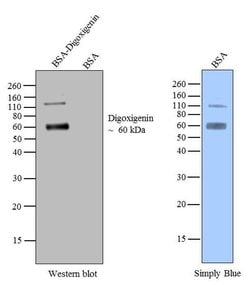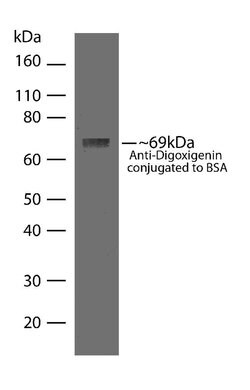Learn More
Invitrogen™ Digoxigenin Recombinant Superclonal™ Antibody (9HCLC)
Rabbit Recombinant Superclonal Antibody
Supplier: Invitrogen™ 710019
Description
Recombinant rabbit Superclonal™ antibodies are unique offerings from Thermo Fisher Scientific. They are comprised of a selection of multiple different recombinant monoclonal antibodies, providing the best of both worlds - the sensitivity of polyclonal antibodies with the specificity of monoclonal antibodies - all delivered with the consistency only found in a recombinant antibody. While functionally the same as a polyclonal antibody - recognizing multiple epitope sites on the target and producing higher detection sensitivity for low abundance targets - a recombinant rabbit Superclonal™ antibody has a known mixture of light and heavy chains. The exact population can be produced in every lot, circumventing the biological variability typically associated with polyclonal antibody production. Note: Formerly called Recombinant polyclonal antibody, this product is now rebranded as Recombinant Superclonal™ antibody. The physical product and the performance remain unchanged.
Digoxin, also known as digitalis, is a purified cardiac glycoside extracted from the foxglove plant, Digitalis lanata. Its corresponding aglycone is digoxigenin, and its acetyl derivative is acetyldigoxin. Digoxin is widely used in the treatment of various heart conditions, namely atrial fibrillation, atrial flutter and sometimes heart failure that cannot be controlled by other medication. Digoxin preparations are commonly marketed under the trade names Lanoxin, Digitek, and Lanoxicaps. Digoxin is also used as an affinity system for nonradioactive labeling and detection of proteins and nucleic acids.
Specifications
| Digoxigenin | |
| Recombinant Superclonal | |
| 0.5 mg/mL | |
| PBS with 0.09% sodium azide | |
| Rabbit | |
| Protein A | |
| RUO | |
| Chemical | |
| Antibody | |
| IgG |
| Western Blot | |
| 9HCLC | |
| Unconjugated | |
| C23H34O5; DIG; Digitalis | |
| Small molecule. | |
| 100 μg | |
| Primary | |
| Store at 4°C short term. For long term storage, store at -20°C, avoiding freeze/thaw cycles. | |
| Liquid | |
| Chemical |
Your input is important to us. Please complete this form to provide feedback related to the content on this product.

